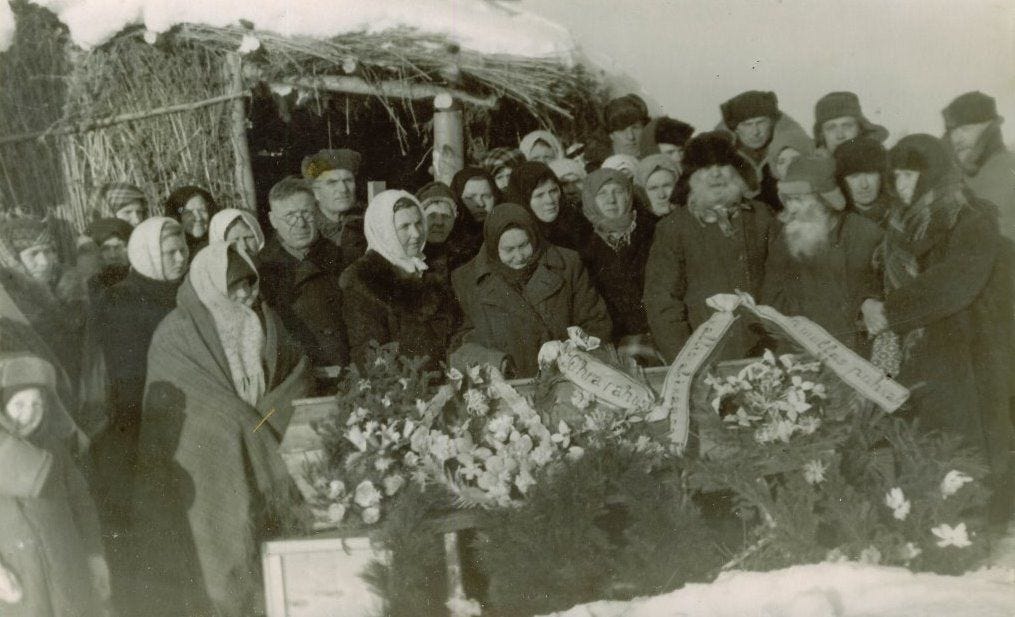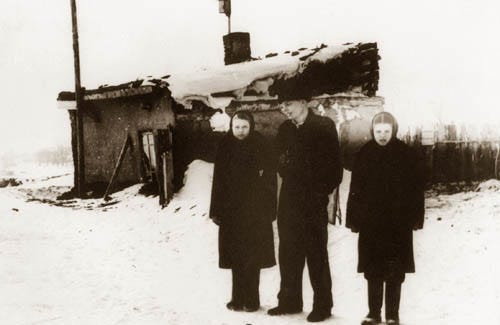Dear friends;
I want to begin by thanking those who have recently signed up to my newsletter, and those who have followed me for some time. As I am a newbie to the mechanics of Substack, it seems some of you received my last post without any introductory warning, so here I am, saying, hello lovelies, here I am. Author, poet, intuitive, mother. Dedicated to freeing the human spirit through consciousness. So very happy to meet you here, and deeply grateful for your presence.
“This Earth is the Land of Stories
There is no other way
We were born to tell stories
to love them and to hear them
until they are done
But the moment you say
I am a storyteller
now you own the story
instead of the other way around
and you walk in the perfection of your path..”
~ Father Forgive Them
Between 1934 and Stalin’s death in 1953, millions of people were deported by the Soviets on the basis of ethnicity, sent to Kazakhstan, Siberia and Far Eastern Asia. Many were sent to camps with unimaginable conditions, and of course many died. These people included Finns, Poles, Koreans, Ukrainians, Estonians, Latvians, Lithuanians, Russian-Germans, Karachays, a Turkish-speaking people inhabiting the North Caucasus, the Kalmyks, a Buddhist people living in southern Russia near the Volga river basin, the Chechens and the Ingush, two Muslim peoples of the North Caucasus, Balkars, a small Turkish people living near the Elbruz Mountain in Northern Caucasus, the Crimean Tatars, a Muslim Turkish-speaking people, Bulgarians, Greeks and Armenians, the Meskhetian Turks, the Khemchins, Kurds and Moldavians.
It was estimated 1.7 million Poles alone were sent to Siberia in 1940, and 1.2 million Russian Germans in 1941. 1
How is this not a story of man’s inhumanity to man?
My ex-mother-in-law and father-in-law fled Estonia during World War II, crossing the Baltic Sea to safety in Sweden while being shot at in the dark of night, narrowly escaping one of these cleanses. My mother-in-law carried her small baby in the boat, and few jewels. She was an admired concert pianist, and left behind one of the finest grand pianos in Europe. Her family lost everything. She was not Jewish, but she was out of favour. Those Estonians who did not escape, ended up on trains headed for Siberian concentration camps, and many years ago she loaned me a book which told the story of an Estonian woman who survived one such camp.
I have since sought to find this book without success, and if any reader knows its title and author, I would love to read it again. It was penned by the daughter of a woman who survived 30 years of horror in these camps, and it was a fascinating retelling. What was of the greatest interest to me was not only the inhumanity of the Soviet guards, but also the behaviour of the prisoners.
Individuals from many nations found themselves in unimaginable circumstances. She tells of how they were loaded on trains, and how one woman tried to save her baby by giving the baby to a family member standing on the platform. A guard took the baby and literally threw it back into the train. Most of the young children died of hunger and exposure in the freezing train cars, before they reached Siberia, including that baby.
Once there, the incredible cruelties continued. Many starved. In Siberia the warm season was so brief they had only a few weeks in which to attempt to grow a few potatoes to last the whole winter. At one point in the story the author’s mother was interrogated by the guards, and when they did not like her response, they dislocated both her wrists and threw her out into the Siberian night to try to survive without the use of her hands.
The prisoners were scattered in huts, and they found their places with their countrymen. Poles with the Polish, Latvians with the Latvians, Estonians with their own.
But what fascinated me about this story, was that instead of the prisoners forging bonds, helping one another, planning a unified means of survival, their nationalistic prejudices seemed to magnify instead. They kept separate from anyone outside of their own ethnicity, and were competitive and even aggressive toward one another. They stole from one another, looked down upon those whom they deemed less sophisticated. When they were put on those trains bound for a frozen nightmare, they brought their beliefs in separation along for the ride.
It has been decades since I read the book, and I have no doubt there were acts of kindness in the midst of it all. Someone did help the author’s mother put her wrists back into their sockets. But the animosity and pettiness amongst the prisoners was a powerful memory of the retelling. Each national grouping awash in their own suffering, their own tribalism, without the capacity to lift up their view to a larger, human paradigm. These people may have been sent to these camps because of their race and nationality, but is the solution to their suffering found in defending these identities? I think not.
What does all this have to do with Whoopi? I must add a disclaimer that I know little about the celebrity comedienne, nor have I ever watched the View. But it seems Whoopi got herself into some cancelling hot water for suggesting on the View that the Holocaust was not about race, that it really was an expression of man’s inhumanity to man. Her comments were interpreted as a grave error, an indication of her ignorance, and Whoopi was quickly deemed guilty of causing offence. She even issued the obligatory apology.
It would seem that the subject of the Holocaust is firmly on the untouchable list, along with other sufferings wherein our identities are considered sacred. We feel that by naming something as racial, we are somehow respected, and to consider any other view is a display of malice. But what if our skin colours, our faiths, our genders and nationalities are indeed secondary characteristics to our humanity? What if, beneath it all, we all bleed, we all feel pain, we are simply souls travelling through incarnations of learning, and no one has escaped hardship along the way. What if in my last lifetime I was the one who was oppressed, but in this lifetime, you have your turn? What do we wish to invite together, on our next go ‘round?
How is silencing Whoopi’s conversation any different from silencing discussions about medical ethics and political corruption? How is public shaming and punishment a helpful response to someone with a different “view”?
Whether Whoopi’s intent was to elevate the conversation to a soul level, instead of remaining stuck on identity, I cannot know. But I do know the true depths of the human wound is where we are meant to look next. When we are ready.
much love, Adi
“Rigidity in form
expresses rigidity of thought
left to rust
unconscious fears will seize us
a perfect breeding ground
to nest
procreate and thrive
That which you have held tight
in your beliefs
bend it
to see if it will soften or break
That which you have resisted
in your body
bend toward it
to relax its hold
That which you have conveniently used
to prop yourself up
let it fall
let yourself fall
like the puppet with cut strings
like the willow in the fierce wind
bow low
and find Grace
in your limbs
Creation is a flexible act.”
~ Father Forgive Them
The Soviet Massive Deportations - A Chronology, Campana Aurélie, Nov 5, 2007








Thank you, Adi!
The heart-wrenching stories of human suffering in the extreme can be witnessed all around us. It is challenging to navigate the past and current mazes of deception, inhumanity, and extensive disregard for the stories that can tell so many stark realities.
The mind and human heart are being tested beyond our privileged comforts and complacent discernment that views and looks on from a distance.
It feels to be the greatest test for keeping one's heart open as it breaks apart into a thousand pieces of the unfathomable collective grief that can be garnered from the mills of history, current events, and times forgotten.
It is relentless, and the penetrating bittersweet gift within it all is the deepening of my compassion and my resolve to not turn my gaze aside while allowing so much suffering to be seen and felt as I sit upon my comfortable perch surveying the terrain of such horrors, atrocities, and the ongoing resilience of the human condition.
Each of our hearts echoes the archives of human suffering. It beckons for the love and courage of a peaceful warrior whose eyes are wide open. -Tru